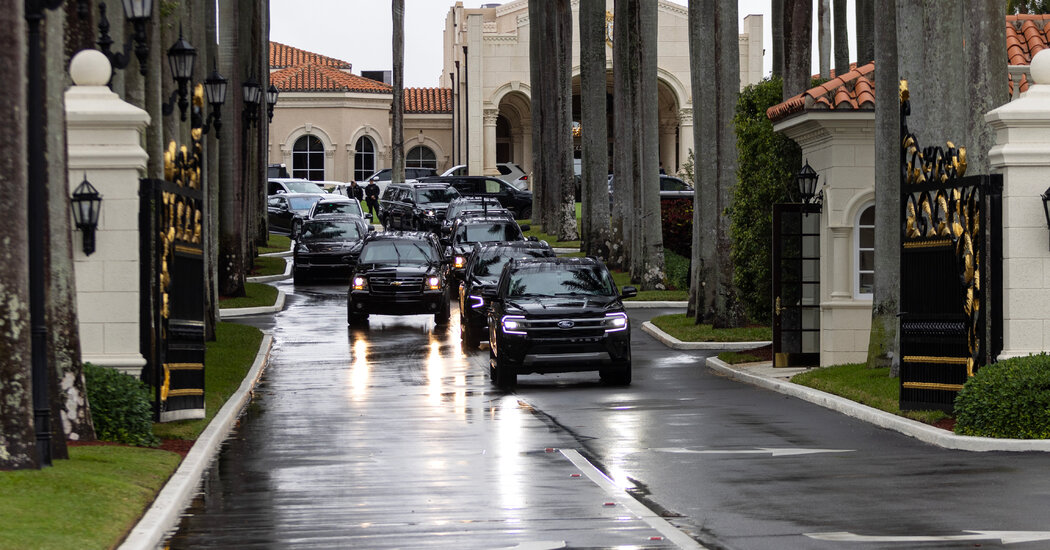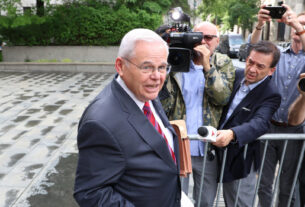When Mayor Eric Adams descended into Palm Beach Thursday night to meet with President-elect Donald J. Trump, he said he just wanted to advance New York City’s interests.
But the context was impossible to ignore: Mr. Adams, facing a federal corruption trial in April and the possibility of prison time, was going to visit the one person in the United States who was capable of pardoning him and who had indicated a potential interest in doing so.
The taxpayer-funded journey to Florida came with substantial political intrigue. For Mr. Trump, a Republican, the meeting could give him leverage in New York City, a place that is typically hostile to him and his party. For the mayor, a Democrat, the visit carried more peril.
Mr. Adams’s poll numbers are in the tank. He is facing several credible primary challengers. And his overtures to Mr. Trump risk damaging whatever hopes the mayor still has of winning a second term in City Hall this year.
“The politics are clearly unhelpful,” said Howard Wolfson, a political strategist for Michael R. Bloomberg, the former mayor. “But the politics are not driving the trip. The politics are clearly subsidiary to the desire to stay out of jail.”
In effect, Mr. Adams is stymied by an apparent conflict of interest that voters have no easy to way to disentangle.
In September, Mr. Adams was indicted on five federal charges of corruption, including bribery, wire fraud and solicitation of contributions from foreign nationals. He pleaded not guilty and has consistently argued, without evidence, that he is the victim of a Biden administration conspiracy to punish him for criticizing the outgoing president’s immigration policies.
In recent weeks, a federal grand jury has heard additional evidence against him, which could signal new charges are coming.
He is scheduled to go on trial in April, just weeks before the Democratic primary for mayor. If a jury finds Mr. Adams guilty, he faces prison time. In 2021, the City Council overwhelmingly passed a law that bars anyone with a felony conviction for public corruption from holding office. The law is being challenged in court.
This fall, Mr. Trump, who was convicted of 34 felonies in May, indicated he felt a kinship with Mr. Adams: “We were persecuted, Eric,” Mr. Trump said at the Alfred E. Smith Memorial Foundation Dinner.
Starting on Monday, after he is sworn in, Mr. Trump will have the power to pardon the mayor. Mr. Adams has said he may even attend the inaugural festivities in Washington, though his team had not confirmed any plans to travel.
New York City and its 8.3 million residents also have a lot at stake. The federal government sends billions of dollars to New York City every year for education, housing, child care and hospitals. More than 400,000 undocumented immigrants call the city home. As the mayor of America’s largest metropolis, Mr. Adams has a natural interest in developing a working relationship with the man poised to govern the nation.
In a statement Friday evening, Mr. Adams said he and the president-elect had discussed issues of importance to New Yorkers, including manufacturing jobs in the Bronx and the cease-fire agreement between Israel and Hamas.
“To be clear, we did not discuss my legal case, and those who suggest the mayor of the largest city in the nation shouldn’t meet with the incoming president to discuss our city’s priorities because of inaccurate speculation or because we’re from different parties clearly care more about politics than people,” Mr. Adams said.
The political problem for the mayor is that voters have no way of knowing if he is in Palm Beach to advocate for the city or for himself, said Basil Smikle, a professor at Columbia University’s School of Professional Studies and a Democratic political strategist.
No city officials traveled with Mr. Adams. Voters, Mr. Smikle continued, might reasonably ask: “What did he promise to Donald Trump to get pardoned? Did he sell the city out politically or policy wise?”
There was little political risk for Mr. Trump in the meeting. Following an election in which he made some of his biggest gains among Black and Latino voters, a prominent Black ally like Mr. Adams could help bolster the president-elect’s support in communities where he still remains broadly unpopular.
There could, however, be some risk in giving Mr. Adams a pardon. The mayor’s political fortunes seem troubled regardless of whether Mr. Trump intervenes, and his popularity in New York City may not be strong enough for Mr. Trump to benefit from helping him.
Some of Mr. Trump’s Republican supporters are upset by the nature of the corruption charges against Mr. Adams, and as the president-elect prepares to grant pardons to an untold number of his supporters who participated in the Capitol riot on Jan. 6, 2021, giving one to Mr. Adams may be a bridge too far.
A spokesman for Mr. Trump did not immediately respond to a request for comment. But advisers to the president-elect have previously said they see Mr. Adams’s situation as reinforcing Mr. Trump’s own narrative that he was a victim of the so-called deep state.
Mr. Trump has also never stopped being fixated on his hometown. And he has not always made conventional political choices.
Some New York City voters are unlikely to look kindly upon a trip to visit Mr. Trump in Florida that was only added to the mayor’s public schedule after The New York Times reported that it was happening. The mayor’s opponents quickly cast it as an obvious act of obeisance that could be damaging to Mr. Adams’s political brand.
When he was elected, Mr. Adams frequently referred to his own “swagger,” a characteristic that he said would help propel New York out of the pandemic’s doldrums. With his taste for nightlife, he sought to send the message that his town was back because he was in charge.
A short flight to Florida could undermine that.
“No New Yorker wants to see their mayor kiss the ring,” Mr. Smikle said. “We’re not that kind of city. We’re the greatest city in the world. People come to us. We don’t go to them. If you’re going down to Mar a Lago to kiss the ring, what happened to that swagger that you talked about?”
Even with record low poll numbers, Mr. Adams still has support among his base of Black voters, some of whom question whether he is being treated fairly by federal prosecutors. A New York Times/Siena College poll in late October found that while only 26 percent of New York City voters approved of the mayor’s job performance, that number rose to 41 percent among Black voters.
An adviser to the mayor argued that a pardon would not necessarily prove to be Mr. Adams’s political death knell, provided it occurred relatively quickly, and that Mr. Adams could spend the months before the primary reminding voters why they elected him the first time.
Even if Mr. Adams were to lose some voters because of their distaste for Mr. Trump, the adviser said, he stood to pick up votes from the Latino, Asian and Orthodox Jewish communities, where Mr. Trump has some support.
If Mr. Adams is putting his status as the Democratic mayor of New York City at risk, he has other options.
For a period of time in the 1990s, Mr. Adams was a registered Republican. He could theoretically run as a Republican again. But there is no guarantee he would win in a city where registered Democrats outnumber Republicans by six to one. Some New York Republicans have thrown cold water on the idea that they would welcome Mr. Adams into their fold, and he has maintained that he will run for re-election as a Democrat.
Still, like most things in modern Republican politics, Mr. Trump could single-handedly scramble those positions.
Mr. Adams could also abandon the mayoralty altogether and chart a new political destiny for himself as a Black MAGA Republican.
The Rev. Al Sharpton, a prominent ally of the mayor’s who has stood by him despite his indictment and a flurry of resignations from his administration, recently warned Mr. Adams, in an interview with Politico, that a pardon could seriously damage his political career.
Before Mr. Adams met with Mr. Trump, he had a text exchange with Mr. Sharpton, the reverend said. Mr. Sharpton said he warned the mayor that Mr. Trump would try to manipulate him for his own purposes.
“I told him I’m concerned that he could misuse you to cover some of his biased policies,” Mr. Sharpton said.
“With his base, he could explain a lot of things,” Mr. Sharpton continued, referring to Mr. Adams. “What he can’t control is what Trump is going to do. And if he’s identified with that, how do you disassociate with that?”
Nicholas Fandos contributed reporting.





